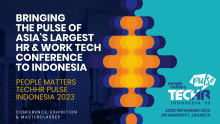Redesigned HR amid post COVID-19 pandemic

Every organization today recognizes that people are their biggest assets and attracting and retaining the right talent can make or break a business. HR as a function is critical to ensure sustainability for the organizations as well as the employees and in doing so, HR organizations have reinvented themselves, time and again, to mirror the changing business and economic conditions.
Currently, COVID-19 is spreading like wildfire and creating havoc across the world. According to IMF, the world economy is predicted to shrink by 3% while the Indian economy will grow by a meager 1.9% in 2020. According to financial experts, we are inching toward one of the worst recessions the world has ever seen. This would have a serious impact on businesses depending on the sector. While some industries like health-care, pharma & medical equipment, online media & entertainment, e-learning & edutech, digital payment & fintech, video & teleconferencing and a few others will benefit in this situation, most organizations would not. While some businesses will permanently close down, the rest will struggle and only those who will be able to manage this downswing well will come out as a winner.
On the other hand, as a result of this economic downturn, there will be both permanent and temporary lay-offs leaving millions of people jobless. People who are already reeling under the stress caused by social isolation due to the lockdown, loss of near and dear ones and in worst cases fighting the infection themselves, are now being over-burdened with the stress of a job loss and the worry of finding their next jobs in this dwindling economy.
A combination of these two above situations puts the HR Departments in an important crossroad, where they need to balance the need of their organizations and that of the employees, simultaneously, and come out as a champion for both. As a result, we will see a new ‘avatar’ of HR, who will emerge in this new normal.
Traditionally HR functions are some combination of the below 5:
- Talent Acquisition & Retention
- Compensation and Benefit Management
- Learning and development
- Performance Appraisal
- Employee Relation & Compliance Management
While the broad umbrella of HR responsibilities will continue to remain the same, what HR will need to offer therein, will see a sea change. Some of the key changes, that I can foresee in the current times as well as in the future can broadly be in the following areas:
- While I am a strong proponent of the fact that Compensation and Benefit is not the most effective retention tool and rarely people leave an organization for compensation, most HR organizations tend to fall back on Compensation and Benefit as a retention mechanism. The hard times that we are in today, requires HR to be creative with the restructuring of compensation and tying it up effectively with retention. Today most companies are struggling with an acute lull in their business and hence don’t have enough work for all their employees. And there is no doubt that ‘people cost’ is a major cost item that the companies are facing. With a sharp reduction in revenue, there might be a tendency to downsize. But downsizing indiscriminately and losing critical employees will prove really costly later. Instead, this is the time for HR to come up with creative ways of restructuring the compensation package to give some relief to the organization while saving jobs as much as possible.
The employees, in the interest of saving their jobs, might need to be open to a temporary reduction in salary; a restructuring of the package where the fixed component would reduce, and variable component would increase or remain unchanged; go on furlough leave i.e. compulsory leave without pay, while ensuring no job loss. Many companies have already postponed the promotion and increment cycle by a year. There are many such creative ways of reducing the cost of the company and helping it stay afloat, without going for downsizing, and with this, once upturn starts both organizations and employees can bounce back together. But in order to do this seamlessly, HR needs to play a crucial role in both strategizing and implementing it effectively. Communicating it effectively to the employees and counseling them to see the benefits from it, would be key to the success of any such policy. People would need to understand that the organization has to survive for employees to succeed and vice versa. And only HR can be that bridge between the two. - Secondly one of the crucial components of employee benefits, in any company, is their health plan or health insurance that they provide for their employees. Unlike the rest of the world, in India, most companies consider only the physical wellbeing of their employees and not their emotional or psychological wellbeing. It’s time to change that. While COVID-19 pandemic is a health crisis, it has also led to an emotional crisis pandemic. Companies need to focus on the emotional wellbeing of the employees and help them tide over the challenge that they are facing. Counseling with psychologists needs to be part of the benefits package that companies provide their employees. This is over and above the active counseling that HR needs to do in these difficult times. HR can also try to institutionalize buddy programs for employees to gain strength from each other. Various creative initiatives can be taken up by HR to help the employees and keep them mentally stable and strong to be at their productive best.
- Security policy is another area that needs to be relooked and probably completely revamped. Most Indian companies, so far, had very stringent security policies, much to the irritation of the employees. Most companies had to relinquish those security policies when people started working from home, with this lockdown. It’s high time HR organizations and IT Security groups, together, start rethinking and revamping these policies to suit the new normal. Stringency needs to be reduced, but not removed completely. Hence the rethinking is imperative.
- There were very few organizations that had a methodology or a tool to measure the output of their employees and hence they only focused on inputs to measure employee productivity. This pandemic has proven what Corporate HR was disregarding for so long - people are by nature performance motivated and do not need constant monitoring to make them perform. In this pandemic, when people worked from home, most people performed well, to the satisfaction of their clients. It’s about time organizations shift from input-based productivity matrices to output based productivity matrices, for different roles and levels and try to translate those to performance appraisals, instead of only measuring inputs. Who else but HR leaders need to take charge for this?
- Finally, the most critical reason why most companies were investing in the brick and mortar offices, inspire of the associated cost, was to inculcate a unifying culture amongst its employees. This undoubtedly is an extremely important aspect of running any organization and hence could justify the high cost of colocation. But today, it’s a reality that this remote working is not going to go away, and more and more we will see people working from remote locations and never meeting their colleagues in person. HR Leaders need to start brainstorming on how to impart this culture training and sensitization while working with remote employees.
While I have highlighted only the innovative areas where HR leaders and managers will need to focus in order to better fit the new normal, the new normal has also eased up quite a few challenges that HR groups have traditionally faced. One of the biggest challenges that the Talent Acquisition teams used to face was to hire the right skill in the right locations. Many a time a skill set available in Pune had to be relocated for a client project being delivered out of Bangalore and it was a very difficult job for HR to ensure a smooth relocation. The new normal will make such challenges a thing of the past.
I think this pandemic is forcing the HR Leaders to think in a way that probably was warranted anyways. But in the new normal it has become imperative. I also think if managed well, in the new normal we will see happier organizations, with more effective and efficient employees, who will become partners to the organization's growth, as opposed to being just employees.

















